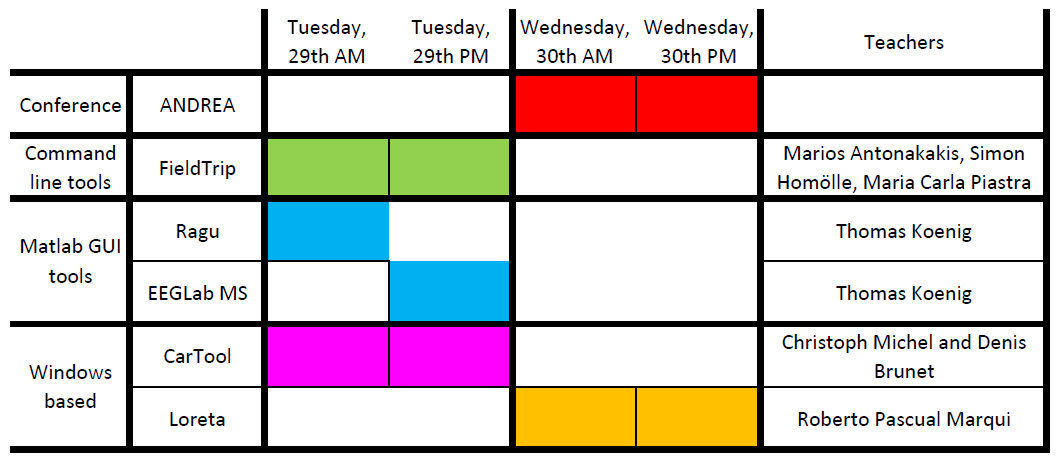Pre-conference training courses
Cartool is a Windows-based software providing a comprehensive spatio-temporal analysis of multichannel EEG/MEG/iEEG data. Emphasis is put on advanced user interfaces with presets and the interactive 3D-visualization of the data in all analysis steps (waveforms, maps, source localization).
Course organizers:
Christoph Michel (University of Geneva)
Denis Brunet (University of Geneva)
All the information and course material can be found and downloaded here:https://sites.google.com/site/cartoolcommunity/baci-2017
The course will cover the following 2 main topics, one per half-day:
- Inverse Solution - the complete story
- electrodes coregistration
- controlling the solution space
- Lead Field processing
- Inverse LORETA & LAURA
- Applying whole datasets
- Inverse of frequency data
- Statistics
- Display
- Electrodes coordinates
- MRI conversion and preprocessing
- Computing the inverse matrix:
- Applying matrix to data
- Micro-states - the traditional and the new ways
- Segmentation
- Statistics
- Inverse Space localization
- Per subject
- Per group
- Best clustering criterion
- Statistics
- Inverse Space localization
- ERPs:
- Resting States:
- EEG preprocessing pipeline
- Making the best of the Cartool Display
- Semi-controlled ERP computation
- Frequency analysis
When aiming at the identification of cortical regions involved in electric (and magnetic) brain activities, the restriction to a channel level analysis can provide only limited information. Source level analysis allows to overcome these limitations and gain a deeper insight into cortical activity.
We then propose a full day workshop on source reconstruction using Fieldtrip Toolbox starting from EEG raw data. Three topics will be analyzed: 1. pre-processing and channel analysis, 2. forward modeling, 3. inverse solutions. Theoretical introductions will be delivered, followed by hands-on sessions based on FieldTrip pipelines
Requirements: Familiarity with Matlab
Teachers: Marios Antonakakis, Simon Homölle, Maria Carla Piastra
Duration: 1 day
Platform: Matlab
All information for the course is made available here: http://www.fieldtriptoolbox.org/workshop/baci2017.
The workshop will be taught by Patricia Milz1, Pascal Faber1, Antonio Fernandez Guerrero2, and Roberto Pascual-Marqui1 (Skype sessions).
1The KEY Institute for Brain-Mind Research, Zurich
2 Institute of Pharmacology and Toxicology, University of Zurich
Morning:
- LORETA source localization theory
- LORETA source localization practice
- Questions & Answers (Skype session with Roberto)
Afternoon:
- effective connectivity measures theory
- LORETA isolated effective coherence (iCoh) practice
- Questions & Answers (Skype session with Roberto)
Course preparation
- Use the link included below to access the LORETA key workshop material.
- Download the files "InstallAndStartupGuideLoretaKey1.pdf" (about 1mb) and "LoretaKey.exe" about 300mb).
- The file "InstallAndStartupGuideLoretaKey1.pdf" contains instructions on how to install the package, in detail, step by step. If there is a problem, please let us know immediately.
- The link to the package is long (computer generated), under*start* and above *end*:
5. Participants are expected to bring their own laptops with windows7 or higher (the program might not work with WindowsXP or lower), with the LORETA software already installed. In addition, it is strongly recommended that participants use the software as instructed in the tutorials, before attending the workshop.
Requirements: Familiarity with resting state EEG data and EEGLAB.
Teacher: Thomas Koenig
Duration: 1/2 day
Platform: Matlab / EEGLAB
You may download the microstate plugin directly thru EEGLABs extension manager (current version is 0.3). Alternatively, you can download a zip-file here: www.thomaskoenig.ch/Microstates0.3.zip.
Sample data is available here: www.thomaskoenig.ch/SampleDataRest21-8-2017.zip
The information contained in multichannel event-related potential data can give precise information about the spatial and temporal distribution of brain information steps. However, for the statistical analysis of such data, the high dimensionality and the unknown correlation structure of the data make an adequate control of type II errors a challenge for statistics.
The course will introduce the topographic consistency test, the topographic analyses of variance (TANOVA), and microstate statistics in ERPs. These tests are custom-tailored for ERP analyses and employ randomization procedures to produce statistical evidence. They include all sensors and work on the entire set of measurements and yield robust, physiologically meaningful conclusions with a minimal number of a-priori choices. We will also introduce Ragu, a Matlab based open-source user interface that allows the efficient application and visualization of the test results. The course will consist of theory primers, hands-on analyses of sample datasets, and time to discuss individual questions.Requirements: Familiarity with multichannel evoked potentials
Teacher: Thomas Koenig & Mara Kottlow
Duration: 1/2 day
Platform: Matlab
The download of the program & documentation, and some further instructions can be found here: www.thomaskoenig.ch/index.php/software/ragu. Please also download the sample data: www.thomaskoenig.ch/SampleDataRagu.zip

